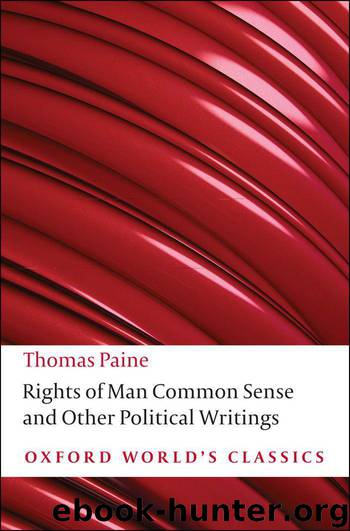Rights of Man, Common Sense, and Other Political Writings (Oxford World's Classics) by Paine Thomas & Mark Philp

Author:Paine, Thomas & Mark Philp [Paine, Thomas]
Language: eng
Format: mobi
Publisher: Oxford University Press
Published: 1995-01-19T00:00:00+00:00
Having thus spoken of constitutions generally, as things distinct from actual governments, let us proceed to consider the parts of which a constitution is composed.
Opinions differ more on this subject, than with respect to the whole. That a nation ought to have a constitution, as a rule for the conduct of its government, is a simple question in which all men, not directly courtiers, will agree. It is only on the component parts that questions and opinions multiply.
But this difficulty, like every other, will diminish when put into a train of being rightly understood.
The first thing is, that a nation has a right to establish a constitution.
Whether it exercises this right in the most judicious manner at first, is quite another case. It exercises it agreeably to the judgment it possesses; and by continuing to do so, all errors will at last be exploded.
When this right is established in a nation, there is no fear that it will be employed to its own injury. A nation can have no interest in being wrong.
Though all the constitutions of America are on one general principle, yet no two of them are exactly alike in their component parts, or in the distribution of the powers which they give to the actual governments. Some are more, and others less complex.
In forming a constitution, it is first necessary to consider what are the ends for which government is necessary? Secondly, what are the best means, and the least expensive, for accomplishing those ends?
Government is nothing more than a national association; and the object of this association is the good of all, as well individually as collectively. Every man wishes to pursue his occupation, and to enjoy the fruits of his labours, and the produce of his property in peace and safety, and with the least possible expence. When these things are accomplished, all the objects for which government ought to be established are answered.
It has been customary to consider government under three distinct general heads. The legislative, the executive, and the judicial.
But if we permit our judgment to act unincumbered by the habit of multiplied terms, we can perceive no more than two divisions of power, of which civil government is composed, namely, that of legislating or enacting laws, and that of executing or administering them. Every thing, therefore, appertaining to civil government, classes itself under one or other of these two divisions.
So far as regards the execution of the laws, that which is called the judicial power, is strictly and properly the executive power of every country. It is that power to which every individual has appeal, and which causes the laws to be executed; neither have we any other clear idea with respect to the official execution of the laws. In England, and also in America and France, this power begins with the magistrate, and proceeds up through all the courts of judicature.
I leave to courtiers to explain what is meant by calling monarchy the executive power. It is merely a name in which acts of government are done; and any other, or none at all, would answer the same purpose.
Download
This site does not store any files on its server. We only index and link to content provided by other sites. Please contact the content providers to delete copyright contents if any and email us, we'll remove relevant links or contents immediately.
The Secret History by Donna Tartt(19097)
The Social Justice Warrior Handbook by Lisa De Pasquale(12193)
Thirteen Reasons Why by Jay Asher(8915)
This Is How You Lose Her by Junot Diaz(6891)
Weapons of Math Destruction by Cathy O'Neil(6283)
Zero to One by Peter Thiel(5805)
Beartown by Fredrik Backman(5763)
The Myth of the Strong Leader by Archie Brown(5511)
The Fire Next Time by James Baldwin(5452)
How Democracies Die by Steven Levitsky & Daniel Ziblatt(5221)
Promise Me, Dad by Joe Biden(5155)
Stone's Rules by Roger Stone(5089)
A Higher Loyalty: Truth, Lies, and Leadership by James Comey(4965)
100 Deadly Skills by Clint Emerson(4929)
Rise and Kill First by Ronen Bergman(4792)
Secrecy World by Jake Bernstein(4755)
The David Icke Guide to the Global Conspiracy (and how to end it) by David Icke(4721)
The Farm by Tom Rob Smith(4516)
The Doomsday Machine by Daniel Ellsberg(4492)
